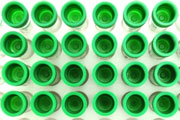Training
Introductory courses are modularly designed to provide customization of material for specific needs. The purpose is to assist scientists and managers build foundational knowledge and practical skills leading to the generation of reliable information for research, development, and manufacturing.
Featured Courses
Introduction to Mass Spectrometry
This introductory course provides a comprehensive overview of the components of a mass spectrometer system as well as the fundamental processes involved in producing mass spectral information. The different varieties of MS interfaces and mass analyzers are described. Easy to understand industry applications are discussed. No prior mass spectrometry experience is required.
Introduction to Mass Spectrometry
This course provides an understanding of the key components of LC/MS instrumentation, operation, advantageous features, and the information derived from analysis. The conversion of LC/UV methods to LC/MS is discussed. Performance characteristics of mass analyzers and LC/MS interfaces are described. Industry related applications of LC/MS are highlighted.
Qualitative LC/MS
This course outlines LC/MS approaches for structure identification. An overview of instrumentation, strategies, and methods currently used in the industry is presented. Practical advantages of MS/MS are highlighted with straight-forward tips for spectral interpretation. LC/MS/MS applications for the structure analysis of metabolites, impurities, natural products, and biomolecules are reviewed. The role of structure databases for technology transfer and product support is illustrated.
Quantitative LC/MS
The advantages of LC/MS techniques for quantitative analysis are presented in this course. The steps involved with developing a LC/MS quantitative method are illustrated along with the practical uses of selected ion monitoring and selected reaction monitoring analyses. The utility of internal standards and standard curves for analysis are emphasized. Examples of LC/MS/MS methods for rapid metabolic stability assessment, cell uptake and clinical pharmacokinetics are described.
Analytical Opportunities in the Pharmaceutical Industry
A recent shift in focus within drug development toward the early and quick evaluation of drug candidates has resulted in significant change throughout the pharmaceutical industry. New strategies have emerged, which emphasize fast analysis times, high throughput capabilities and rugged, reliable analytical methods. With the increased utilization of combinatorial drug discovery technologies, organizations are realizing that previously established metrics for resource utilization cannot be simply scaled-up proportionately. Creative strategies must be devised as part of an overall process and successfully implemented.
This course will provide an overview of the evolving drug development process from an analytical perspective, and provide insights into the critical role of analytical technology and measurement for accelerated development. Recent examples that illustrate the changing needs of the pharmaceutical researcher will be described. The emergence of new criteria for method development, automated analysis, data handling, and information management will be discussed. "Analytical opportunities" will be addressed with regard to significant changes in strategies for pharmaceutical analysis.
Collaborative Course
High Throughput Method Development and Automation Approaches for Bioanalytical Sample Preparation
Offered in Collaboration with Sample Prep Solutions
This practical one-half day course presents high throughput techniques for performing bioanalytical sample preparation prior to LC/MS/MS analysis. Applications of the 96-well microplate format as a solution to meeting the increasing demands for greater throughput in bioanalysis are reviewed. Specific approaches to performing rapid and efficient method development utilizing the microplate format are emphasized. The sample prep procedures covered include solid-phase extraction, protein precipitation, liquid/liquid extraction and filtration. Procedures demonstrating the use of semi-automated liquid handling workstations (e.g., MultiPROBEII and Quadra96) with the microplate format are also presented.


